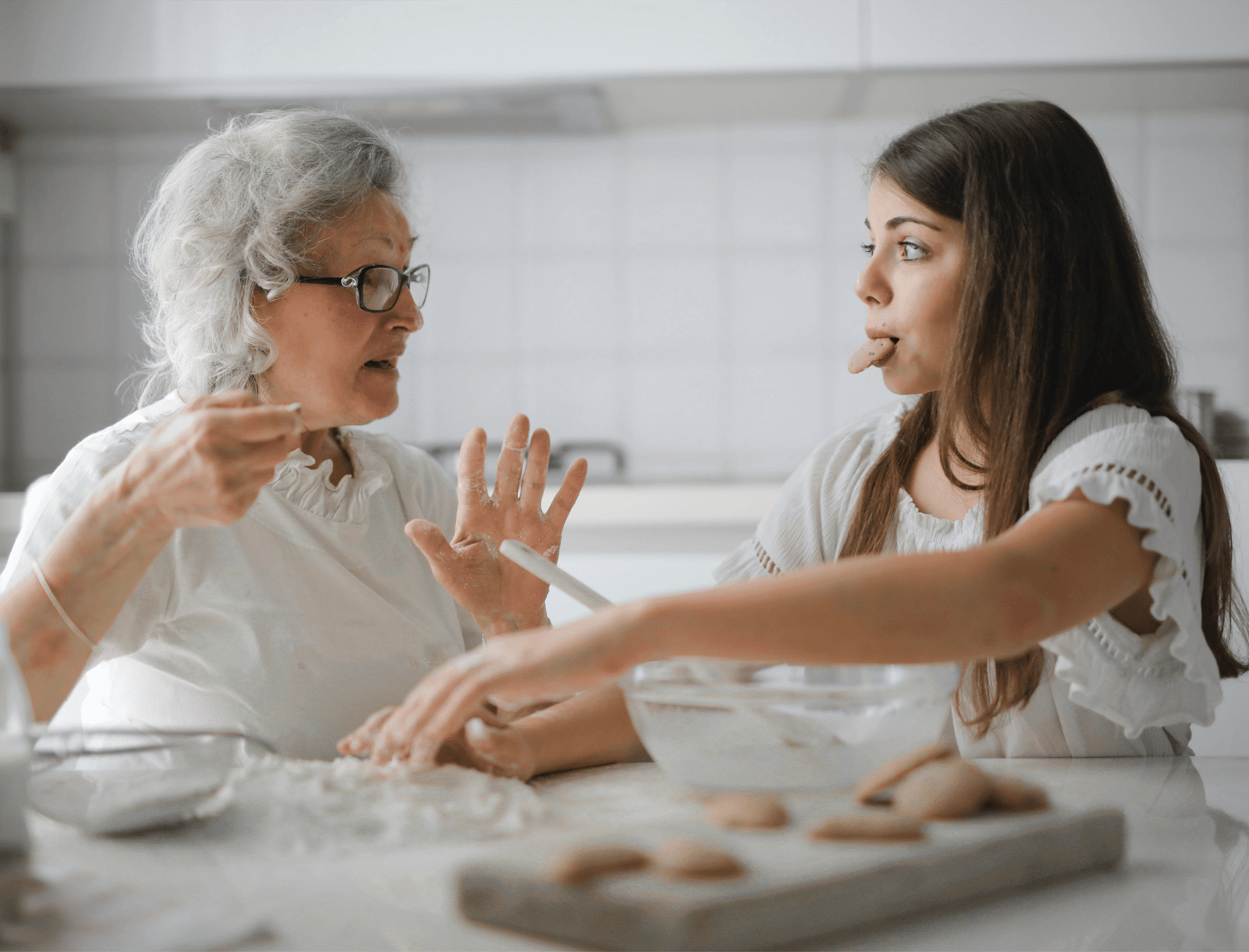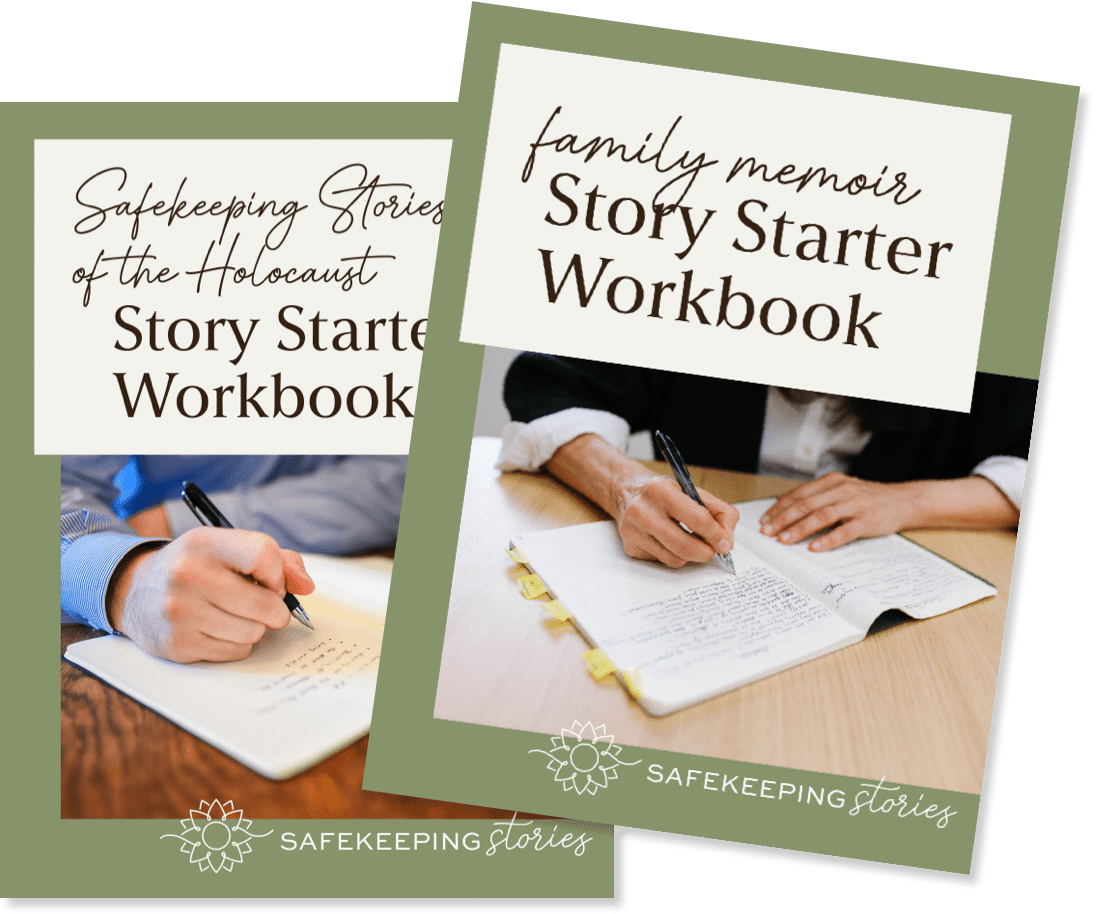Was your parent, grandparent, or other family member a Holocaust survivor? Perhaps you always wondered why your parent never shared their wartime story with you. Or maybe you did some family history research or took a DNA test and discovered you have Jewish ancestry.
Some Holocaust Survivors Never Shared Their Story
Georgia Hunter interviewed her grandmother for a school project when she was fifteen. She learned a surprising truth about her family’s past. Her grandfather, Eddy Courts, was a Holocaust survivor. He was born with the name Addy Kurc. “I had no idea that I was one-quarter Jewish or that my grandfather was raised in Poland. I assumed he was American through and through,” Hunter says. She decided to research her family’s Holocaust story. She wrote a historical fiction novel based on her grandfather’s story because she wanted “this important story to be accessible to her kids.” It wasn’t just her kids who found the book, We Were the Lucky Ones, engaging. It was a bestseller and is now a TV mini-series.
These days, we hear survivor stories all the time. Survivors speak on International Holocaust Remembrance Day. They share their story in classrooms for educational purposes. Videos of survivor testimonies circulate on social media. But it took decades for this widespread sharing of Holocaust stories to evolve. There are many survivors like Addy Kurc who never shared their story.
Some Holocaust stories take more than one generation to share. Learn how to preserve and share your family’s story in our Safekeeping Stories of the Holocaust Workshop, designed specifically for children and grandchildren of survivors.
Why Your Family’s Holocaust Story Feels Like a Secret
Here are four reasons why your family member may have kept their Holocaust history to themselves.
1. Silence Helped Them Cope With Trauma
If your family member was a Holocaust survivor, they may have packed their traumatic past locked away inside. It was the only way they could move forward after the war. Holocaust survivor Leo Bretholz explains,
“There was no psychologist, there was no social worker. Today, when you have a stress syndrome after an event—a plane crash, big fire, shooting in a school—the psychologists, psychiatrists, and counselors are immediately there to tell you what to do to make it easier to cope. But we didn’t have that.”
In the 1940s and 50s, people were not aware of the impact of trauma. Survivors did not receive any emotional support for their pain. To think that the trauma experienced by a Holocaust survivor did not receive any support is unbelievable. They did it by not speaking about the past.
They Experienced Survivor’s Guilt
A Holocaust survivor didn’t necessarily feel a sense of pride for having survived the war. Instead, many felt shame or blame about what happened to them. Family members in other countries asked, “How did you let this happen to you, like a sheep led to slaughter?” Some survivors grappled with “survivor guilt” because they survived the war and their other family members didn’t. Alternatively, they may have found it too difficult to share about the past because of the unspeakable acts of violence they experienced. It is unlikely that a Holocaust survivor would want to talk about the past because it brought up too many complicated, painful feelings.
They Were Still Working Hard to Survive
Furthermore, the life of a Holocaust survivor after the war was essentially a second survival. Many survivors focused all their time and energy on building a life from nothing in a new country. They had to learn a new language, create a new family, and find work to support themselves. They kept the wartime memories deep inside. Getting out of bed every day was a priority.
2. They Wanted to Protect Their Children
Your family member may have been a Holocaust survivor focused on providing their children with a happy childhood. This may have included a lovely home, a safe community, an education, a synagogue, and financial security. However, it would not involve tales of tragic loss and wartime terror. A part of them was a survivor missing their home or hoping to find missing family members. Another part was an American who wanted to belong, get ahead, and give their children a better life than the one they had. They made it to the goldene medina and were not going to burden their children with their pain.
Speaking About the Holocaust Was Largely Taboo Before 1960
Historian Tom Segev explains, “Until 1960, when the trial of Nazi Adolf Eichmann was aired on radio and TV, the Holocaust was largely a taboo. Parents wouldn’t talk to their children. Children wouldn’t dare ask.” As one child of a Holocaust survivor put it,
“The parents of the ‘second generation’ could not bear to look back into that vale of tears. ‘We are doing it for the children,’ I can hear them reassuring each other, excusing their silence. But the children understood that they were different, saw their mothers weep, their fathers’ averted gaze, and knew not to ask.”
If you were a child or grandchild of a Holocaust survivor, bits and pieces of their Holocaust history may have been present in unspoken ways without your realizing it. For example, they may have had nightmares, depression, anxiety, or unusual concerns about food.
The Role of Intergenerational Trauma
Mt. Sinai neurologist and psychiatrist Dr. Rachel Yehuda grew up in Cleveland in a community of Holocaust survivors. She wondered if stress and trauma impacted the children of Holocaust survivors biologically. She studied them and found that survivors can pass along trauma to their kids and grandkids through their DNA. This emerging field is called epigenetics, and Yehuda is a “pioneer.”
3. They Didn’t Consider Themself “a Holocaust Survivor”
Felice was just a baby when her parents asked a French family to care for her during the war. Shortly after, the Nazis killed Felice’s parents in Auschwitz. After the war, Felice lived in various orphanages because the Nazis had also killed the rest of her family. Despite this, Felice said, “I’m not a survivor. I didn’t go through a camp.” For decades after the war, among European Jewish immigrants, there was a hierarchy around who was a “survivor.” It was those who spent the war in Jewish ghettos, concentration camps, or in the Jewish resistance who were “survivors.” Your family member may have been a Holocaust survivor like Felice, who spent the war in physical hiding or emigrated to another country in the 1930s and never considered themselves a “Holocaust survivor.”
The Definition of a Holocaust Survivor
Today, according to the United States Holocaust Memorial Museum, a “Holocaust survivor” is: “any (person), Jewish or non-Jewish, who (was) displaced, persecuted, or discriminated against due to the racial, religious, ethnic, social, and political policies of the Nazis and their collaborators between 1933 and 1945. In addition to former inmates of concentration camps, ghettos, and prisons, this definition includes, among others, people who were refugees or were in hiding.”
As subsequent generations realize their parent or grandparent was a Holocaust survivor, many people like Georgia Hunter are researching their family’s history to discover the untold stories.
4. They Were No Longer Jewish
Your family member may have been a Holocaust survivor who assumed a non-Jewish identity during the war. If they had non-Jewish features (blond hair and blue eyes), they might have passed as a non-Jew during the war by purchasing counterfeit identity papers, moving to a new town, and praying no one would catch on.
Children Separated From Their Families—and Their Religion
As a child, they may have been a Holocaust survivor who rode the Kindertransport or traveled through the Hollandse Schouwburg in Holland. They may have lived with a Christian family. But more often than not, the Nazis killed their Jewish parents, and so they never came back. After the war, some Jewish children continued to live with their adopted Christian families. Others lived in Christian orphanages.
Learn more about how to start recording what you know about your family’s history
When these Jewish children grew up and had children of their own, they may not have revealed to their children or grandchildren that they were Holocaust survivors or that they were born Jewish due to a variety of confusing and conflicting emotions. They may have felt guilt for not retaining their Jewish identity (after all, their parents died for it), curious about it since they never got to learn about it as a child, and appreciation for their Christian caregivers who had risked their lives to raise them. In addition, given their wartime experiences, they may have feared being Jewish.
It Can Take Multiple Generations To Tell a Family’s Holocaust Story
Your family is not the only one to have a hidden Holocaust past. Former U.S. Secretary of State Madeleine Albright was raised Catholic and shared her hidden Jewish and Holocaust family history just before she was sworn in as U.S. Secretary of State. Playwright Tom Stoppard told the story of his discovery of his Jewish and Holocaust history in the Tony Award-winning play Leopoldstadt. There is a generation of Jews in Poland now who were raised Catholic and are now finding out from their grandparents that they were Jewish.
While the silence was necessary for many Holocaust survivors to move forward from devastating tragedy, subsequent generations can uncover what was hidden and honor their past—for themselves and their children. This quote by Adam Ganz resonates with many of the children and grandchildren of Holocaust survivors who have written their family’s Holocaust story in our workshop:
“Silence seemed to be the only way to express the immensity of what had happened…but it doesn’t communicate. It isolates further…reaking the silence isn’t the end, it’s the beginning.”
If you are a child or grandchild of a Holocaust survivor, our Safekeeping Stories of the Holocaust Workshop can help you explore and write your family’s story. Join our Waitlist or book a call with Jill to learn more.


